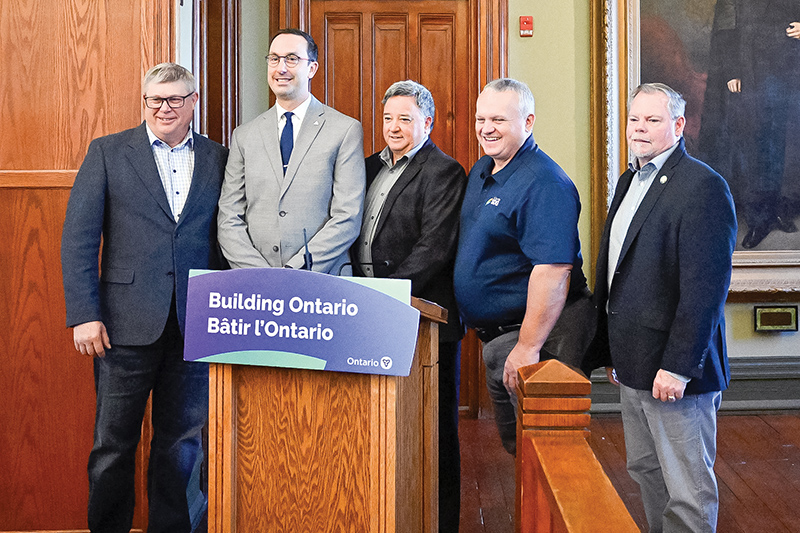Several members of Counties Council were on hand for the announcement by MPP Nolan Quinn. From left: Warden-elect and South Glengarry Deputy Mayor Martin Lang, Stormont, Dundas and South Glengarry MPP Nolan Quinn, Warden and North Glengarry Mayor Jamie MacDonald, South Dundas Mayor Jason Broad, South Stormont Mayor Bryan McGillis. Tinkess Photo
CORNWALL – Stormont, Dundas and South Glengarry MPP Nolan Quinn announced yesterday, Nov. 13, that the Ontario government is making a substantial investment to the United Counties of Stormont, Dundas and Glengarry to help renew and rehabilitate critical infrastructure. The funding will be delivered in 2025 through the Ontario Community Infrastructure Fund (OCIF) and is part of the government’s $190 billion capital plan to build and expand more homes, highways, hospitals, transit and high-speed internet across the province.
The announcement was made at the United Counties building at 26 Pitt St. in Cornwall.
“Our government’s $10,055,615 investment to renew and rehabilitate critical infrastructure in Stormont-Dundas-South Glengarry reflects our unwavering commitment to responsible governance and community well-being,” said MPP Quinn. “Through the Ontario Community Infrastructure Fund, we are ensuring that our municipalities have the support they need to maintain vital services and promote sustainable growth. This funding is part of a broader, strategic capital plan that prioritizes the needs of small, rural, and northern communities. By addressing infrastructure challenges head-on, we are reinforcing our dedication to equitable development and enhancing the quality of life for all residents of Stormont-Dundas-South Glengarry.”
Warden and North Glengarry Mayor Jamie MacDonald said that the investment will allow work to be completed in a more economical way.
“We’re going from Grant Avenue in Maxville to the outer limits of Prescott Russell,” said Warden MacDonald. “So, it’s almost seven kilometres of road. It’s nice for us to be able to do something in one…doing it once, doing the whole distance saves us money, as opposed to in the past year, sometimes we’re going to three kilometres at a time and then having to reset the following year with the same contractors to come in and do the other half of the road.
So, it’s nice with this money that we’ll be able to do it all at one time, lots of cost savings.
In this way, it also means that other projects can move ahead in the timeline. “It’s huge,” added Warden MacDonald. “I mean, we have a backlog of roads to do. We’re looking, you know, right now we’re working on County Road 22 next year, hopefully that will get paved, one of the worst roads in SDG, so looking forward to getting some work done on that one. And, you know, then again, we get to move our priorities to other, other places and counties.”
In 2025, Ontario will allocate $400 million in OCIF funding to help 423 small, rural and northern communities build roads, bridges, water and wastewater infrastructure. Communities may accumulate funding for up to five years to address larger infrastructure projects.
A breakdown of how the funds are distributed is as follows: $5,051,688 in Cornwall, $371,947 in North Stormont, $883,374 in South Stormont, $515,475 in North Dundas, $676,324 in South Dundas, $495,151 in South Glengarry and $2,061,656 to SDG.
The OCIF provides funding for local infrastructure projects in municipalities with populations under 100,000, rural and northern municipalities, as well as for Local Services Boards that own water or wastewater systems. Funding allocations are based on a formula that accounts for the different needs and economic conditions of each community.
In 2024, the Ontario government provided $400 million in funding through the OCIF to 425 communities. Starting in 2022, the government increased its investment for the OCIF by $1 billion over five years.

Terry Tinkess is a professional photographer, educator and journalist. He has been making a living with a camera and keyboard since 1999 and has been featured in such publications as The Ottawa Citizen, Cornwall Standard Freeholder, The Globe and Mail, The Miami Herald, Ottawa Construction News, The Ontario Construction Report, Ontario Home Builder Magazine, Reed Construction Data, Canadian Potato Business and most recently, The Record and Eastern Ontario AgriNews. Terry lives in Ingleside, Ontario with his wife Brenda, Mia the anxious Pittie and cats Wally and Chubbers.








